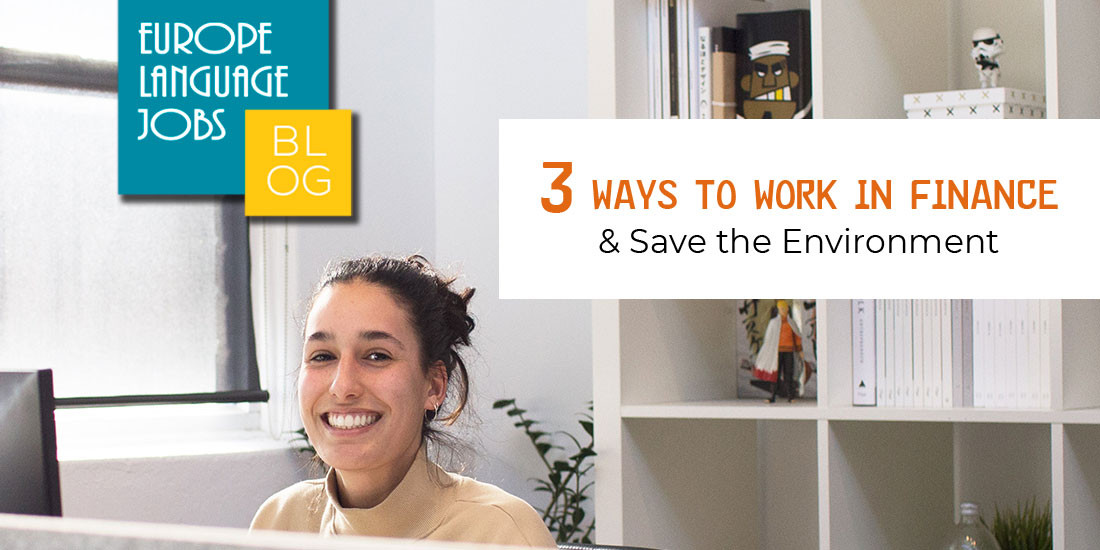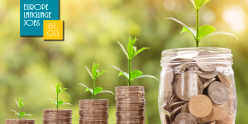Thanks to Fridays for Future, but unfortunately also due to more frequent and severe natural catastrophes in recent times (e.g., Australian fires), more and more people have become aware that the climate crisis is acute and that we need to act now.
Usually, this awareness and need to change is discussed in relation to our daily behaviour – in other words, what we eat, buy, wear or where and how we travel. However, another area of interest to promote sustainability is our daily job.
What do we do against climate change in our everyday job? Are we maybe even contributing to global warming with our daily work? And is the company we are working for following sustainability principles, or rather disregarding them?
While these questions are said to be more relevant for millennials and young job seekers, it might be legitimate to say that in light of recent climate events also more experienced employees are increasingly asking themselves how they could contribute to a greener world through their everyday job.
Although the financial industry is generally seen as one of the main culprits of the climate crisis (pollution, mass production, exploitation etc.), there are three notable job areas where a career in finance wouldn’t be that bad for the environment after all.
Sustainable Finance
A quick search on LinkedIn for jobs in the European Union dealing with Sustainable Finance has yielded 1,440 results. Clearly, the demand for experts in the field of sustainable finance has increased tremendously in the past months. Together with recent developments at the European Union (e.g., EU taxonomy, European Green Deal), the financial sector and related areas (e.g., consulting, research) are imploringly looking for new talents that can support them in developing expert knowledge on how to analyze, measure and implement investment practices related to sustainable finance.
According to Frank van den Brink, the Chief Employee Experience Officer (CHRO) of the Dutch bank ABN AMRO, analytics and sustainability are two of the most wanted skills in the financial industry these days. Hence, being an expert on ESG principles (environment, social, governance) and/or knowing how to identify, measure and scale data dealing with sustainability would be of great advantage if you aspire a career in sustainable finance.
In fact, by supporting the financial sector in shifting capital to sustainability projects (e.g., renewable energy), defining exclusion criteria (e.g., coal, fossil fuel) and allocating money to promising green investments (e.g., green/carbon-neutral technologies), you can have a real impact on greening our economy, and thereby our planet.
Ethical and Responsible Banking
Another possibility of promoting a greener economy is working in the retail banking sector that is exclusively ascribed to ethical and responsible banking. Triodos in the UK, for example, has experienced a 26% increase in customers in the past three years (2016-2019).
Similarly, the German green and ethical bank GLS has reported an average increase of 24% annual growth since 2009, counting 237,000 clients in 2019. Ethical banks are increasingly adopting banking software services to streamline their operations and enhance their digital offerings to customers.
What is more, there are a number of fintechs and neobanks (e.g., Tomorrow, bunq) that have recently appeared on the market providing full “green” banking services but operating completely online.
Thus, responsible banking does not only seem to become more popular among the public, but it also presents you with new opportunities to work in the retail banking sector, and still have a positive impact on the environment. These competitive players offer you a bandwidth of new job opportunities, ranging from working as a traditional banker, analyst or business and brand manager to more contemporary jobs such as big data analyst, web and app developer or data scientist.
Accountancy
Lastly, but very closely related to the financial industry, is the area of accountancy. While many financial actors (e.g., asset managers, investment banks, corporations) are currently reporting ongoing carbon-neutral, divesting from brown industries (e.g., coal, fossil fuel) or investing green and sustainably, it’s up to the accountants to hold those who make these announcements responsible. Hence, as a result of this new corporate climate awareness, a new business field for accountants to assess, control and supervise these green pledges has recently opened up.
In the UK, for example, new Environmental Reporting Guidelineshave been introduced in March 2019 that require corporations to report on environmental matters such as energy or greenhouse gas emissions. Although these regulations currently only apply to the UK, recent discussions at the European level imply that similar reporting guidelines might sooner or later be also rolled out to various industrial sectors across Europe. Thus, having analytical models and measurements in place that provide reliable, accurate and transparent environmental corporate reporting becomes of paramount interest in the corporate and financial sector. Taking a job in accountancy, therefore, provides you with the necessary skills by which you can accompany businesses on their way to define, measure and meet their sustainability objectives in the near future.
However, before you start your new job search now, let me point out that it does not necessarily have to be a job in finance if you want to move the idea of sustainability in our economy forward. If we want to transform our planet to become more sustainable, we all need to tackle the problem from various points at the same time.
Hence, even if you work for a big conglomerate or a corporation that is currently criticized for its business practices by environmental activists (e.g., technology, fast-moving consumer industry, transportation), do not simply quit. Instead, try to use your power as a participative employee and do your best in advocating for more sustainable business practices in your own organization.
If there is enough pressure by consumers, employees and other stakeholders (e.g., shareholders), corporations might eventually feel obliged to change their practices, thereby hopefully contributing to a greener future.
The author is a Marie Sklodowska-Curie research fellow at the University of Oxford, studying the role of the news media for sustainable finance. To find out more about her project, please visit: https://www.nadinestrauss.com/sustainable-finance








Erik Lima Bezerra1y ago
Really Useful!
Really Useful!